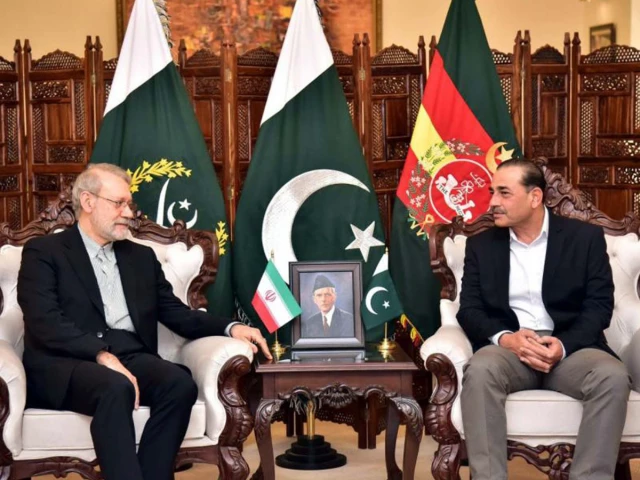Secretary of Iran’s Supreme National Security Council meets Field Marshal Asim Munir at headquarters in Rawalpindi
Chief of Army Staff Marshal Syed Asim Munir met with Ali Ardeshir Larijani, Secretary of Iran’s Supreme National Security Council, at the headquarters, Wednesday, November 26, 2025. Photo: APP
Pakistan and Iran demonstrated renewed willingness to work together against terrorism as Chief of Army Staff Field Marshal Syed Asim Munir met Ali Ardeshir Larijani, Secretary of Iran’s Supreme National Security Council, met at the Rawalpindi headquarters on Wednesday.
COAS Munir reiterated Pakistan’s commitment to regional peace and highlighted the importance of “closer collaboration with Iran to combat terrorism”, citing changing geopolitical realities as a driver for deeper strategic ties.
Meanwhile, Larijani praised Pakistan’s role in regional security and expressed Iran’s keenness to strengthen bilateral relations through continuous dialogue and coordinated security efforts.
Key points discussed
Counter-terrorism cooperation: Both sides emphasized coordinated efforts to combat militant threats affecting border regions and the wider neighborhood.
Strategic and Security Ties: Given the evolving regional geopolitics, both countries are committed to strengthening their defense and intelligence collaboration.
Regional peace and stability through diplomacy: Larijani highlighted the importance of dialogue and lasting partnership between Pakistan and Iran to address common challenges.
Read: End of the Pak-Saudi joint military exercise “Al-Battar II”
Relations between the two neighbors saw a marked warming in 2025. In May, Munir visited Tehran and held talks with Major General Mohammad Bagheri, Chief of General Staff of the Iranian Armed Forces, with the aim of intensifying military cooperation, improving border security mechanisms and exploring better trade connectivity between the border regions.
During the Iranian Foreign Minister’s visit to Islamabad in January 2024, the two countries agreed to establish a joint coordination mechanism and station military liaison officers at the common border – a confidence-building measure intended to prevent future escalation and improve border management.
This new opening comes at a time of increased regional instability with cross-border militancy, shifting alignments and continued pressures across South and West Asia. For both Islamabad and Tehran, transforming sporadic tactical coordination into a structured strategic partnership could help proactively manage security threats and stabilize their shared border.
Additionally, deeper cooperation – military, intelligence and diplomatic – could pave the way for broader collaboration on border management, trade and regional diplomacy. This recent meeting reflects the continuation and deepening of a renewed strategic engagement.




